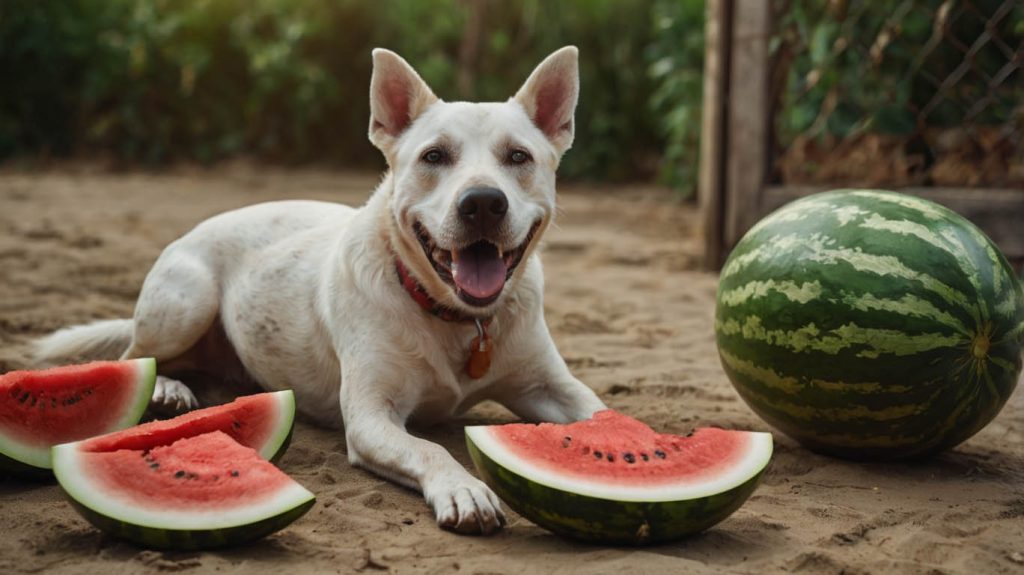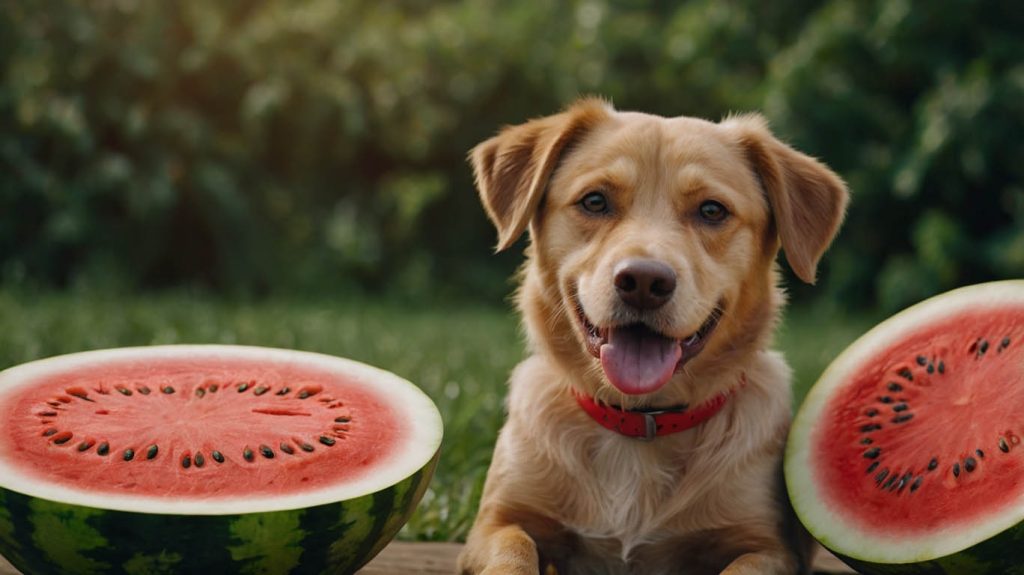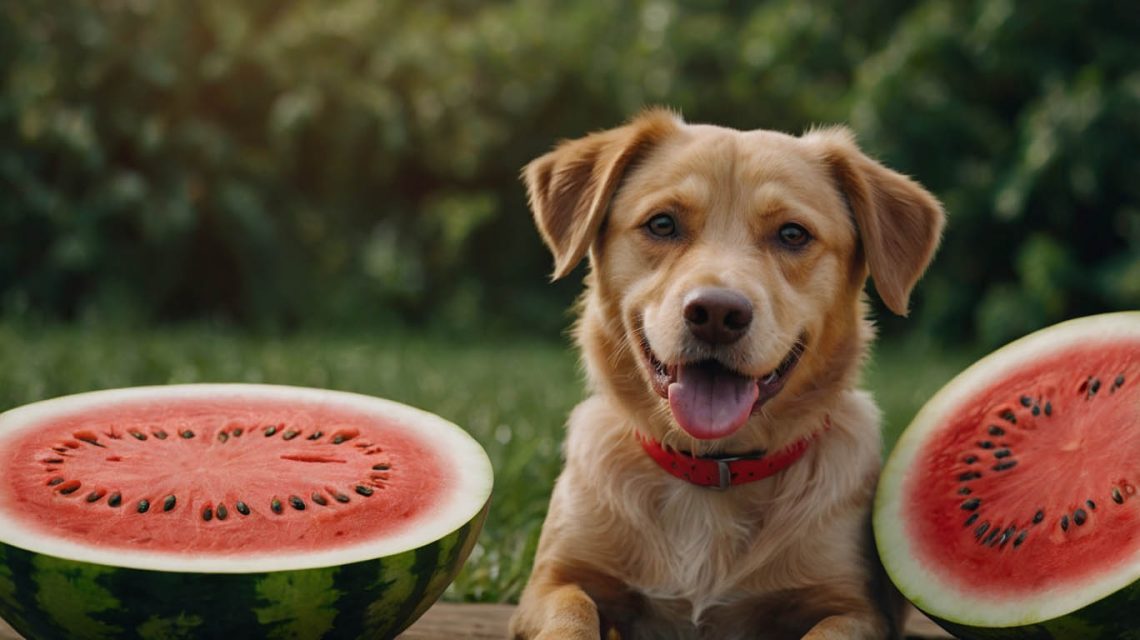The Complete Answer: Can Dogs Have Watermelon?
You’re enjoying a perfectly sweet, hydrating slice of watermelon on a warm afternoon when you feel that familiar, gentle pressure of a head on your lap. Your dog is looking up at you with an expression that clearly says, “Are you going to share that?” This moment brings up a crucial question for any conscientious pet owner: Can dogs have watermelon? It’s a simple query with a layered answer. The exciting news is that yes, dogs can absolutely have watermelon, and it can even be good for them. However, this treat comes with a set of non-negotiable safety rules you must follow.
This definitive guide will walk you through the entire story of sharing watermelon with your dog. We will begin by exploring the excellent health benefits packed into this summer fruit. Subsequently, we will highlight the serious dangers posed by the seeds and rind. Furthermore, we will provide a clear, step-by-step tutorial on how to prepare it safely and serve the right amount. Consequently, you will have the total confidence to know exactly how and when your dog can enjoy this refreshing snack.
Why You Should Always Ask, “Can Dogs Have Watermelon?”
Before we celebrate the benefits, it’s vital to understand why pausing to ask this question is so important. A dog’s digestive system is not the same as a human’s. Many foods we eat without a second thought, like grapes, onions, chocolate, and anything with the artificial sweetener xylitol, are highly toxic to them. Therefore, investigating any new “human food” before offering it is a fundamental practice of responsible pet ownership. By asking can dogs have watermelon, you are protecting your pet from potential gastrointestinal upset or a serious medical emergency.

The Health Benefits When Dogs Have Watermelon
When prepared correctly, watermelon is not just a safe treat; it is a genuinely healthy one. It is a low-calorie, nutrient-rich snack that offers several key advantages for your canine companion.
Optimizing Hydration: Why Dogs Can Have Watermelon on Hot Days
One of the most significant benefits is watermelon’s incredible water content. Composed of about 92% water, it serves as a delicious and enjoyable way to supplement your dog’s daily water intake. This makes it an ideal treat after a long walk, a fun day at the park, or simply on a sweltering day. While it should never be a substitute for fresh, clean water, it’s a fantastic way to boost hydration.
A Nutrient-Rich Treat for Your Dog
Watermelon is more than just water and sugar; it’s packed with beneficial vitamins and minerals. For instance, it provides:
- Vitamin A: Essential for supporting vision, immune function, and skin and coat health.
- Vitamin C: A powerful antioxidant that helps reduce inflammation and protect the body from damaging free radicals.
- Vitamin B6: Plays a vital role in countless bodily functions, from amino acid metabolism to neurotransmitter production.
- Potassium: An important electrolyte that supports healthy kidney and heart function.
This nutrient profile is a key reason why the answer to can dogs have watermelon is a positive one.
A Low-Calorie Snack with Fiber and Antioxidants
Compared to many fatty, processed dog treats, watermelon is an excellent low-calorie option. This makes it a great choice for dogs on a weight management plan. It also contains dietary fiber, which aids in healthy digestion. Furthermore, the vibrant red color comes from lycopene, a potent antioxidant. Authoritative sources like the American Kennel Club (AKC) confirm that antioxidants are valuable for a dog’s overall health and cellular function.

The Critical Risks: When Your Dog Should Not Have Watermelon Parts
The safety of this delicious treat hinges entirely on proper preparation. While the pink flesh is safe, two other parts of the fruit are definite hazards.
The Serious Danger of Watermelon Seeds
This is the most critical safety warning. Watermelon seeds, especially the mature black ones, can cause an intestinal blockage if ingested in sufficient quantity. This is a painful and life-threatening condition where the digestive tract is obstructed, often requiring emergency surgery. The risk is significantly higher for smaller dog breeds. To ensure your dog can have watermelon safely, you must remove every single seed.
Why the Rind is Completely Off-Limits
The tough, green rind of the watermelon is indigestible for dogs. Chewing on it can lead to two major problems:
- Gastrointestinal Upset: The rind can cause vomiting and diarrhea.
- Choking and Blockages: If a dog bites off and swallows a piece of the rind, it can become a serious choking hazard or cause a dangerous blockage in the esophagus or intestines.
How to Safely Let Your Dogs Have Watermelon
Now for the fun part: preparing this treat safely for your eager pup. Follow these steps every time.
The Proper Preparation Method is Key
- Start with Seedless (If Possible): The easiest and safest option is to buy a seedless watermelon. This dramatically reduces the risk from the start.
- Wash the Exterior: Before you cut into the fruit, wash the outside thoroughly to remove any dirt, pesticides, or bacteria.
- Remove All Traces of Rind: Carefully slice the pink flesh away from the tough green and white rind. Discard the rind in a secure trash can your dog cannot access.
- Deseed Meticulously: Even seedless watermelons can have small white seed casings. For maximum safety, remove any seeds you see, black or white.
- Cut into Bite-Sized Cubes: Dice the pure watermelon flesh into small, manageable pieces appropriate for your dog’s size to prevent choking.
How Much Watermelon Can Dogs Have?
Moderation is essential. A good rule of thumb is the 10% treat rule, meaning treats should make up no more than 10% of your dog’s daily caloric intake.
- Extra-Small Dogs (under 20 lbs): A couple of small, one-inch cubes.
- Medium Dogs (20-50 lbs): A small handful of cubes.
- Large Dogs (over 50 lbs): A generous handful, up to about a cup.
Always introduce new foods slowly. Give your dog one small piece first and watch for any signs of stomach upset.
The Final Verdict on Watermelon for Your Dog
So, let’s answer the question one final time: can dogs have watermelon? Yes, they absolutely can! It is a safe, healthy, and hydrating treat when—and only when—you remove the seeds and rind completely and serve it in moderation. By following these simple but vital guidelines, you can share the joy of this refreshing summer staple with your furry best friend without any worry.
Do you share watermelon with your dog? What are their other favorite healthy snacks? Let us know in the comments below! And for a complete overview of what’s safe and what’s not, check out our comprehensive guide, [The Ultimate List of Human Foods Dogs Can and Can’t Eat].


